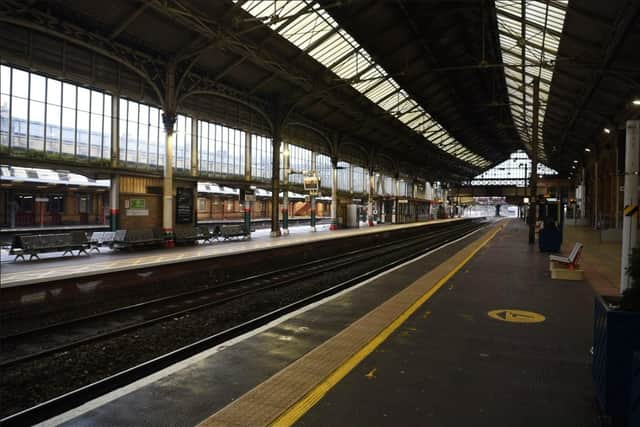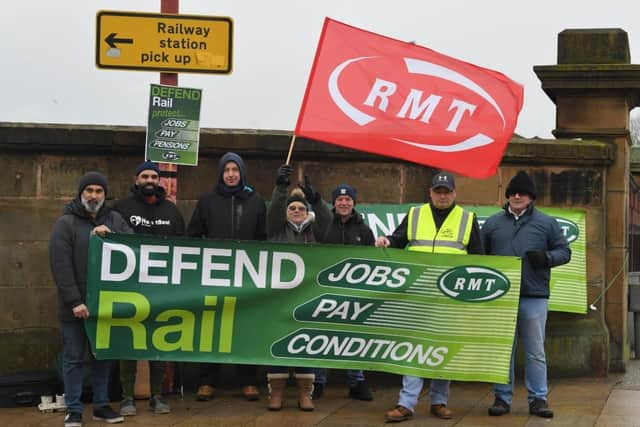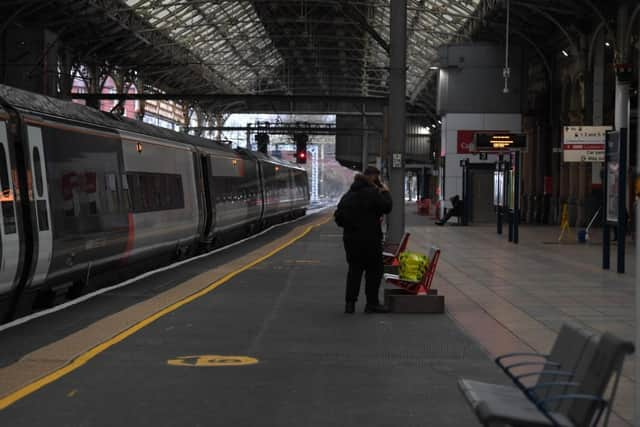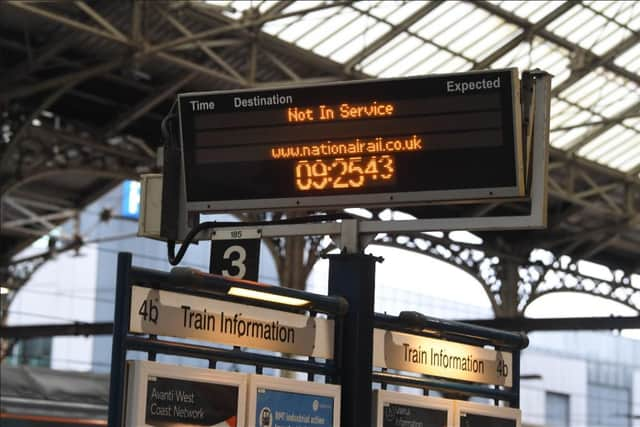Rail strikes 2023: Preston train station all-but deserted as first industrial action of New Year hits return to work
and live on Freeview channel 276
And operators expect the misery to continue until Sunday with more strikes by the RMT and ASLEF unions scheduled over the next four days as tens of thousands of workers take action over pay, jobs and conditions.
Members of the Rail, Maritime and Transport union (RMT) at Network Rail and 14 train operators are staging two 48-hour walkouts from today and Friday, while drivers in the ASLEF union will strike on Thursday. Picket lines were again mounted outside railway stations across the country in a repeat of what became a familiar sight last year.
Advertisement
Hide AdAdvertisement
Hide AdPassengers, including those returning to work after the festive break, were being warned to expect “significant disruption” as only a limited number of trains will run. The advice is to only travel if absolutely necessary, allow extra time and check when first and last trains will depart. There is a warning there may also be disruption to services on Sunday as the striking workers return to their duties.


On RMT strike days - Tuesday, Wednesday, Friday and Saturday - around half of the network will shut down, with only about 20 per cent of normal services running. Trains that do run will start later and finish much earlier than usual – with services typically running between 7.30am and 6.30pm on the day of the strike. The train drivers’ (ASLEF) strike on Thursday will affect 15 operators and will result in even fewer services running, with some companies operating “very significantly reduced” timetables.
At Preston, which normally sees thousands of passengers arrive or depart every day, the platforms were eerily quiet today with only a handful of trains still running. RMT pickets were on duty outside the station, as they have been throughout the long-running dispute.
Last month Preston branch chairman Martin McCarrick told the Post: "We are here again disputing the Government's proposals for the railway, which are to close every ticket office in the country. They are also looking to cut 2,500 maintenance worker jobs, that is Network Rail staff who walk the lines and inspect the railway to make sure it is safe.


Advertisement
Hide AdAdvertisement
Hide Ad"We are not opposed to a modernisation of the railway, but what we are opposed to is mass job cuts and redundancies and ticket office closures which are going to make this railway unsafe.
"Now this dispute could have ended if it hadn’t been for the Government’s intervention, where they put on the table driver-only operated trains – that is a train with nobody else on it, just the driver. What we want people to ask themselves is would you feel safe on a train with that kind of operation?”
Daniel Mann, director of industry operations at the Rail Delivery Group, said today: “No-one wants to see these strikes go ahead, and we can only apologise to passengers and to the many businesses who will be hit by this unnecessary and damaging disruption.
“We would advise passengers to only travel if it is absolutely necessary during this period, allow extra time and check when their first and last train will depart. Passengers with tickets for between 3-7 January can use their ticket the day before the ticket date, or up to and including Tuesday 10 January.


Advertisement
Hide AdAdvertisement
Hide Ad“This dispute will only be resolved by agreeing the long overdue reforms to working arrangements needed to put the industry on a sustainable footing, rather than unions condemning their members to losing more pay in the new year.”
Mick Lynch, RMT general secretary, said there “is an unprecedented level of ministerial interference” preventing a settlement to the dispute. He said: “The Government is blocking the union’s attempts to reach a negotiated settlement with the rail employers.
“We have worked with the rail industry to reach successful negotiated settlements ever since privatisation in 1993, and we have achieved deals across the network in 2021 and 2022 where the Department for Transport has no involvement.
“Yet in this dispute, there is an unprecedented level of ministerial interference, which is hamstringing rail employers from being able to negotiate a package of measures with us, so we can settle this dispute. We will continue our industrial action campaign while we work towards a negotiated resolution.”


Advertisement
Hide AdAdvertisement
Hide AdASLEF general secretary Mick Whelan said the union is “in it for the long haul”, adding: “We don’t want to go on strike but the companies have pushed us into this place. They have not offered our members a penny, and these are people who have not had an increase since April 2019.
“That means they expect train drivers at these companies to take a real-terms pay cut – to work just as hard for considerably less – when inflation is running at north of 14 per cent."
A Department for Transport spokesperson said: “Passengers have rightly had enough of rail strikes and want the disruption to end. The Government has demonstrated it is being reasonable and stands ready to facilitate a resolution to rail disputes. It’s time the unions came to the table and played their part as well.
“Inflation-matching pay increases for all public sector workers would cost everyone more in the long term – worsening debt, fuelling inflation, and costing every household an extra £1,000. Unions should step back from this strike action so we can start 2023 by ending this damaging dispute.”